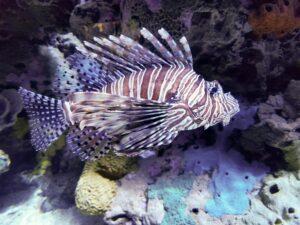ELTE: zebrafish and tomato fish together can help reveal brain function
According to new results from researchers at ELTE and the HUN-REN Hungarian Research Network, zebrafish and tomato fish can complement each other and help to reveal the functioning of the brain: while zebrafish are ideal for studying social behavior, tomato fish may be crucial for researching solitary problem solving and memory mechanisms – reads a statement from the ELTE Institute of Biology sent to MTI on Thursday.
 According to their statement, zebrafish have long been the “star” of laboratories, but now an old-new model animal has come to the fore again: the tomato fish. Its special working memory and consistent exploration strategy show behavior that was previously more typical of mammals.
According to their statement, zebrafish have long been the “star” of laboratories, but now an old-new model animal has come to the fore again: the tomato fish. Its special working memory and consistent exploration strategy show behavior that was previously more typical of mammals.
They pointed out that zebrafish have revolutionized laboratory biomedical research for three decades: several hundred individuals can be examined at the same time, and its special feature is that even its entire brain activity can be recorded. The disadvantage is that as a social species, its behavior is always influenced by its peers living in the school, or the lack thereof, so if it is observed in isolation, the results can be distorted by its innate social tendencies.
Researchers from ELTE and the HUN-REN Institute of Experimental Medicine (KOKI) therefore turned to the more solitary, territorial species, the tomato fish, which behaves quite differently and has become particularly interesting for researchers for this very reason.
A comparative study of the two species revealed spectacular differences. It is advantageous for the zebrafish to be surrounded by its peers: it discovers its environment faster if it is not alone. The tomato fish, on the other hand, explores unknown terrain confidently and effectively even without company, and in fact, often more effectively than the zebrafish, they wrote.
“The surprising discovery was that the tomato fish overtakes the zebrafish not because of its speed or greater curiosity, but because of a special strategy. It uses a so-called ‘alternation’: it always swims towards unexplored areas, as if it remembers exactly where it has already been. This behavior uses working memory and has so far been described in mammals, not in fish,”
explains behavioral neuroscientist Zoltán K. Varga (KOKI), first author of the study.
Related news
Cheese-cocoa-peach jam: these are the most popular cookie flavors
🎧 Hallgasd a cikket: Lejátszás Szünet Folytatás Leállítás Nyelv: Auto…
Read more >Hungarians don’t replace their furniture – JYSK research reveals a conscious, long-term planning market
🎧 Hallgasd a cikket: Lejátszás Szünet Folytatás Leállítás Nyelv: Auto…
Read more >Related news
Nestlé to sell remaining ice-cream assets but commits to Froneri venture
🎧 Hallgasd a cikket: Lejátszás Szünet Folytatás Leállítás Nyelv: Auto…
Read more >Lidl guarantees fairer prices for cocoa farmers
🎧 Hallgasd a cikket: Lejátszás Szünet Folytatás Leállítás Nyelv: Auto…
Read more >40 secure jobs, sustainable solutions – new BURGER KING® in Csepel
🎧 Hallgasd a cikket: Lejátszás Szünet Folytatás Leállítás Nyelv: Auto…
Read more >









